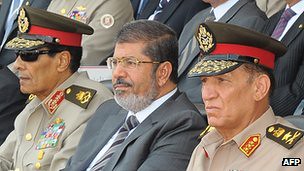
Dr. Mohamed Morsi, the president of Egypt, seating alongside the dismissed top Egyptian military officials, Field Marshal Tantawi on his right and Chief Gen. Sami Enan. The two political forces are adjusting to the outcome of the national elections., a photo by Pan-African News Wire File Photos on Flickr.
August 19, 2012 7:14 pm
Time for the Brotherhood to deliver
David Gardner
Financial Times
Egypt, and the world, seem to have underestimated Mohamed Morsi, the Islamist who in June’s historic vote became the country’s first democratically elected president. He was not, after all, the first choice of even his own party, formed by the powerful and secretive Muslim Brotherhood. But the army, in overall charge of the country since Hosni Mubarak was overthrown last year by the revolutionaries of Tahrir Square, has just had an up-close opportunity to take his measure.
Last week Mr Morsi sacked the army’s most senior commanders – Field Marshal Mohamed Hussein Tantawi, Mubarak’s defence minister for 20 years, and General Sami Anan, chief of staff and a close US ally, as well as the heads of the air force and navy, and intelligence chief Gen Murad Muwafi.
Gen Muwafi was in fact fired earlier after a bloody attack this month by jihadists on Egyptian troops in northern Sinai, close to the Israeli border. Yet the accelerating loss of state control in the Sinai may have furnished Mr Morsi with a pretext and trigger for his purge – if that is indeed what these forced retirements are. That is almost certainly not the whole picture.
When, just ahead of the presidential election, the generals dissolved the Islamist-dominated parliament and snatched its legislative powers, it looked like a pre-emptive putsch. Some compared it with Algeria where, 20 years ago, the army cancelled an election to forestall an Islamist victory, igniting a savage civil war. Yet, even in those febrile June days, Egypt was looking more like Turkey in 1997, when the army pushed an Islamist party out of government. Soon after, the neo-Islamist Justice and Development party came to power and, following a long tug of war, elbowed the overmighty generals aside. What has just happened in Egypt could be similar but, on closer inspection, looks neither Algerian nor Turkish but very Egyptian.
Since the fall of Mubarak, a former air force commander in power for 30 years, the Brothers and the generals dug in behind the Supreme Council of the Armed Forces have been rival power centres, occasionally colluding with but more often conspiring against each other. The jostle for power has paralysed the country and brought the economy to its knees. Now it looks as though the Brotherhood and the army’s interests are intersecting. One of the newly ascended officers, Mohamed el-Assar, deputy defence minister, let it be known through Reuters, the news agency, that Mr Morsi had consulted the SCAF, including Field Marshal Tantawi, on the changes. There are three main reasons the army seems to be going along with this.
First, the Morsi presidency has the legitimacy of a democratic mandate, which the generals recognised in allowing his electoral triumph to stand. With their reputation tattered by their overweening and incompetent performance over the past 18 months, Egypt’s praetorians need a slice of that legitimacy.
Second, Mr Morsi and the Brotherhood have been tactically astute in winning over the younger generals, impatient for promotion. The seemingly eternal Field Marshal Tantawi, moreover, was chosen by Mubarak in part for his mediocrity. To hold on to his position he had to hold down any talent that could outshine him or, more to the point, build a challenge.
The third interest is common to the old guard and the new commanders: to secure immunity from prosecution; to control their own budget; and retain their tentacular business interests.
From Mr Morsi and the Brotherhood’s point of view, it is politically invaluable to be seen to be able to leech power from the army. The president also seized back the legislative and executive powers the SCAF had awarded itself in June, seemingly accepted by the army without demur.
The constitutional court, packed with Mubarak-era holdovers, may take a different view, but Mr Morsi has pre-emptively bolstered his position by naming two judges with reputations for independence as his vice-president and justice minister. But is Cairo now set to become a Tehran on the Nile, as some US commentators are warning? Members of the SCAF have said they will not allow a sharia-based, Islamist state in Egypt. Yet the Brothers are expected to do well when new parliamentary elections are held, and the constitution, still to be drawn up, will reflect this make-up.
The Brotherhood, founded in Egypt in 1928, is a patient organisation. Having waited more than 80 years, it will doubtless see no need to rush things now. One institution it will have its sights on, however, is the army. For all its privileges, it is more attached to a generally pious society than its Turkish counterpart.
That leaves the democratic resilience that will have to be developed by citizens demanding the government, now that the power struggle with the army is in abeyance, repairs the broken economy and gets Egypt back on its feet. The time for slogans is over. Egyptians need to make the Brotherhood deliver.
No comments:
Post a Comment